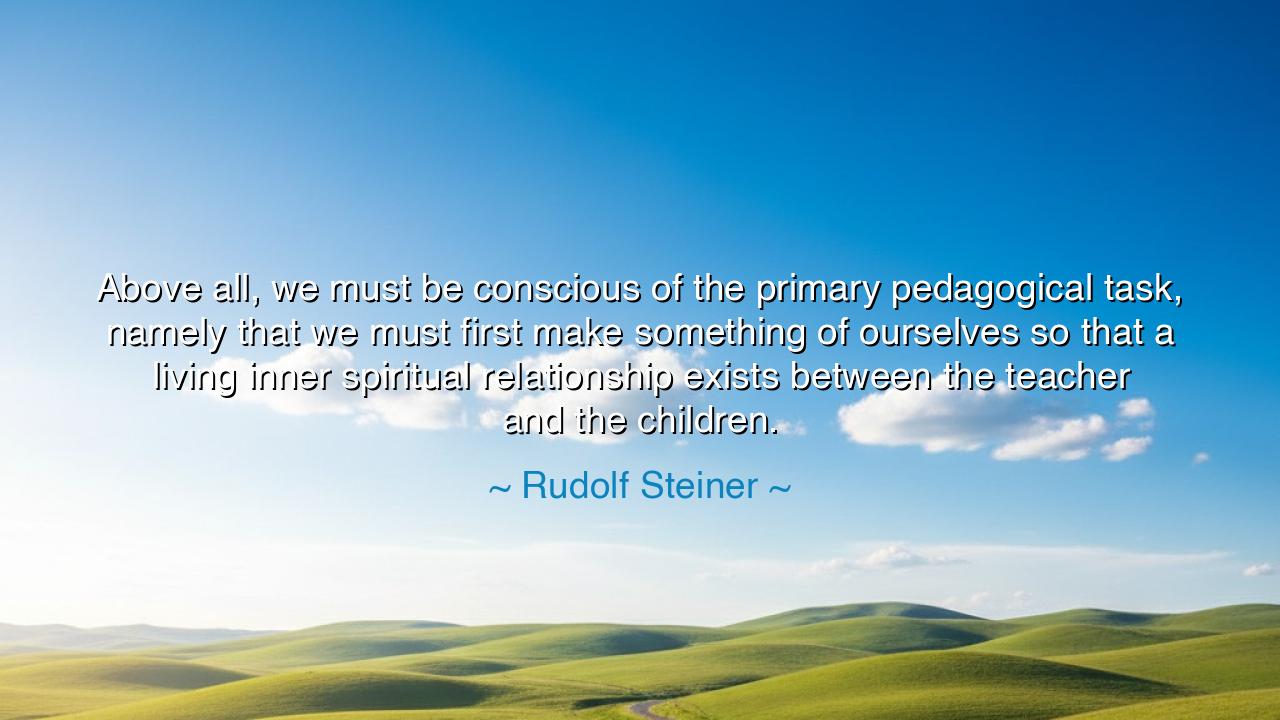
Above all, we must be conscious of the primary pedagogical task
Above all, we must be conscious of the primary pedagogical task, namely that we must first make something of ourselves so that a living inner spiritual relationship exists between the teacher and the children.






Rudolf Steiner, the philosopher of spirit and the father of Waldorf education, once declared with deep conviction: “Above all, we must be conscious of the primary pedagogical task, namely that we must first make something of ourselves so that a living inner spiritual relationship exists between the teacher and the children.” In these words he reveals a truth that resounds through the ages: that the most powerful lesson a teacher can give is not in books or facts, but in the radiance of their own being. A child does not only learn from words; they absorb the very essence of the person who stands before them.
The origin of this thought lies in Steiner’s vision of education as a sacred work, a weaving of body, soul, and spirit. For him, knowledge alone could not suffice. To fill a child with information without awakening their inner life was to betray the purpose of teaching. The teacher must therefore begin not with the child, but with themselves. They must cultivate patience, courage, reverence, and love, for only then can a true relationship be born — one that nourishes the child as sunlight nourishes the seed. This was Steiner’s revolution: that education is not transmission, but transformation, and the first transformation must occur within the educator.
History offers luminous witnesses to this principle. Consider the great philosopher Socrates, who taught not through books or systems, but through the life he embodied. His disciples followed him not only for his words, but for the force of his soul, the integrity of his character, the courage with which he lived and died. The true lesson was himself. Or look to Maria Montessori, who entered the classroom not to dominate, but to guide, having first transformed herself into one who could observe with patience and love. Like Steiner, she knew that children are mirrors, and they reflect back not the teacher’s words alone, but their inner state.
One may also remember the story of Mahatma Gandhi, who when asked to tell a child to give up sugar, refused until he himself had first renounced it. Only then did he call the boy and say: “Now I can ask you, for I have done it myself.” In this simple act he embodied Steiner’s wisdom: before we seek to shape others, we must shape ourselves. A living relationship cannot be born from hypocrisy; it flourishes only where authenticity and inner work have prepared the soil.
The lesson for us is clear: the teacher is not merely an instructor, but a living example. If we wish children to grow in courage, we must cultivate courage in ourselves. If we wish them to value truth, we must live truth with consistency. If we wish them to wonder at the world, we must ourselves carry wonder in our eyes. This is the “primary pedagogical task” — not the writing of curricula, nor the perfection of methods, but the cultivation of the self into a vessel of integrity, love, and inspiration.
What, then, shall we practice? Let each who teaches, whether in schools or in life, devote themselves daily to inner growth. Practice patience when tested, so that children may learn patience by your example. Practice humility in error, so that they may learn the nobility of admitting faults. Practice reverence toward nature, toward others, toward life itself, so that they may inherit not cynicism but gratitude. And above all, cultivate love, for it is love that turns mere instruction into living education.
Therefore, O seekers of wisdom and guides of the young, remember Steiner’s charge: “We must first make something of ourselves so that a living inner spiritual relationship exists between the teacher and the children.” This is not easy, for it demands constant self-examination and growth. Yet it is also glorious, for it transforms both teacher and child into co-travelers on the path of becoming. Do not underestimate the silent power of your presence; your being speaks louder than your words. And if you tend your own soul as carefully as you tend your lessons, you will plant seeds in children that bloom long after memory of facts has faded — seeds of spirit, character, and love that endure for a lifetime.






AAdministratorAdministrator
Welcome, honored guests. Please leave a comment, we will respond soon